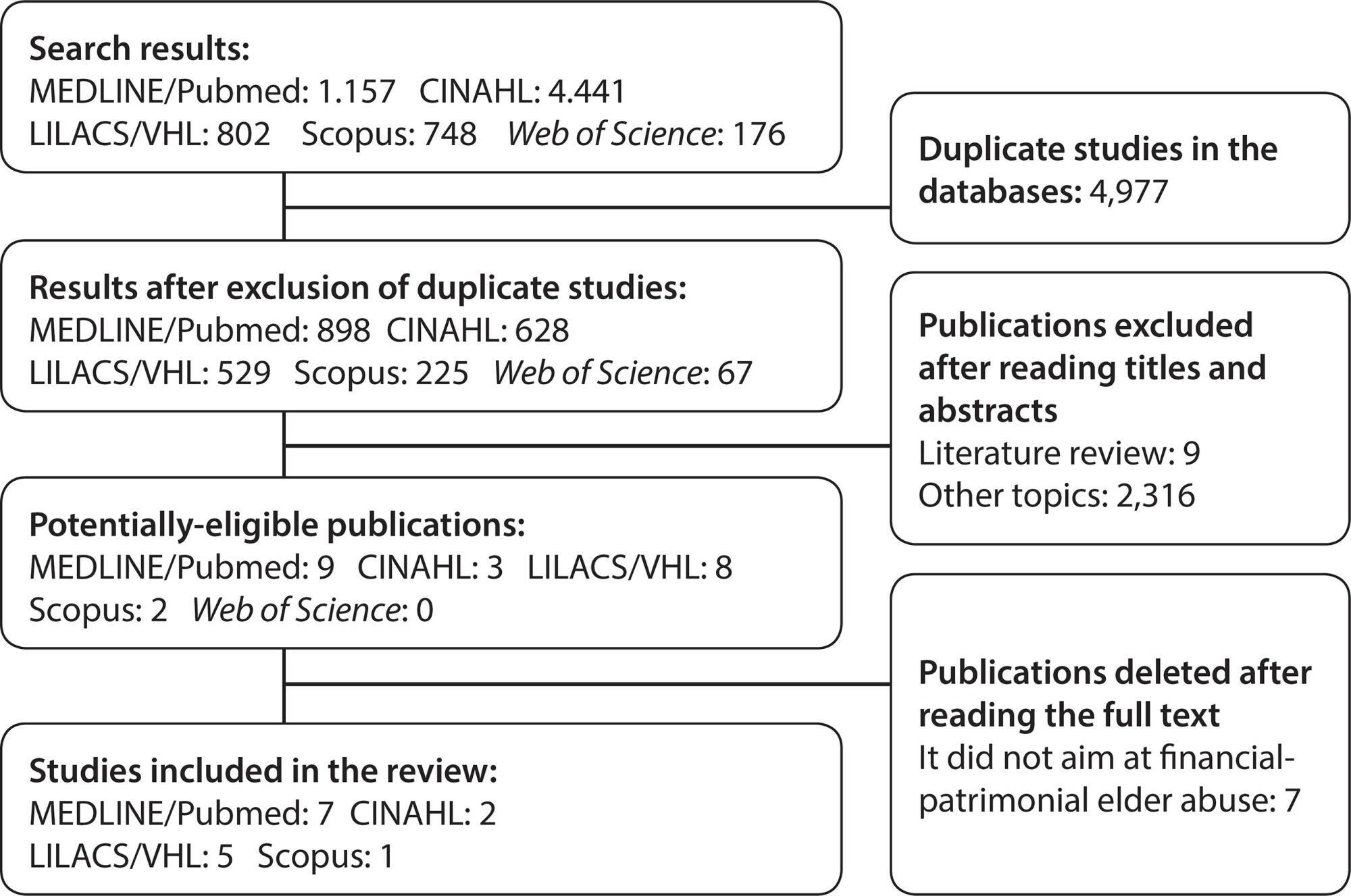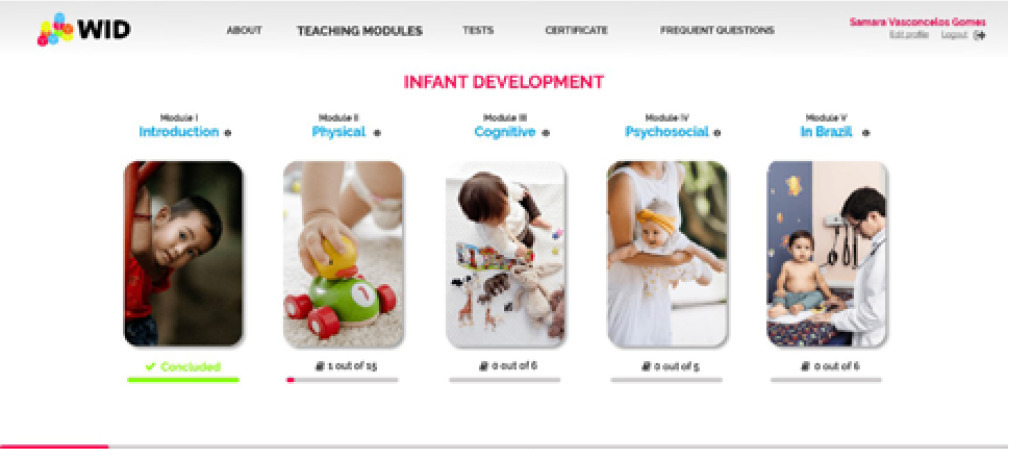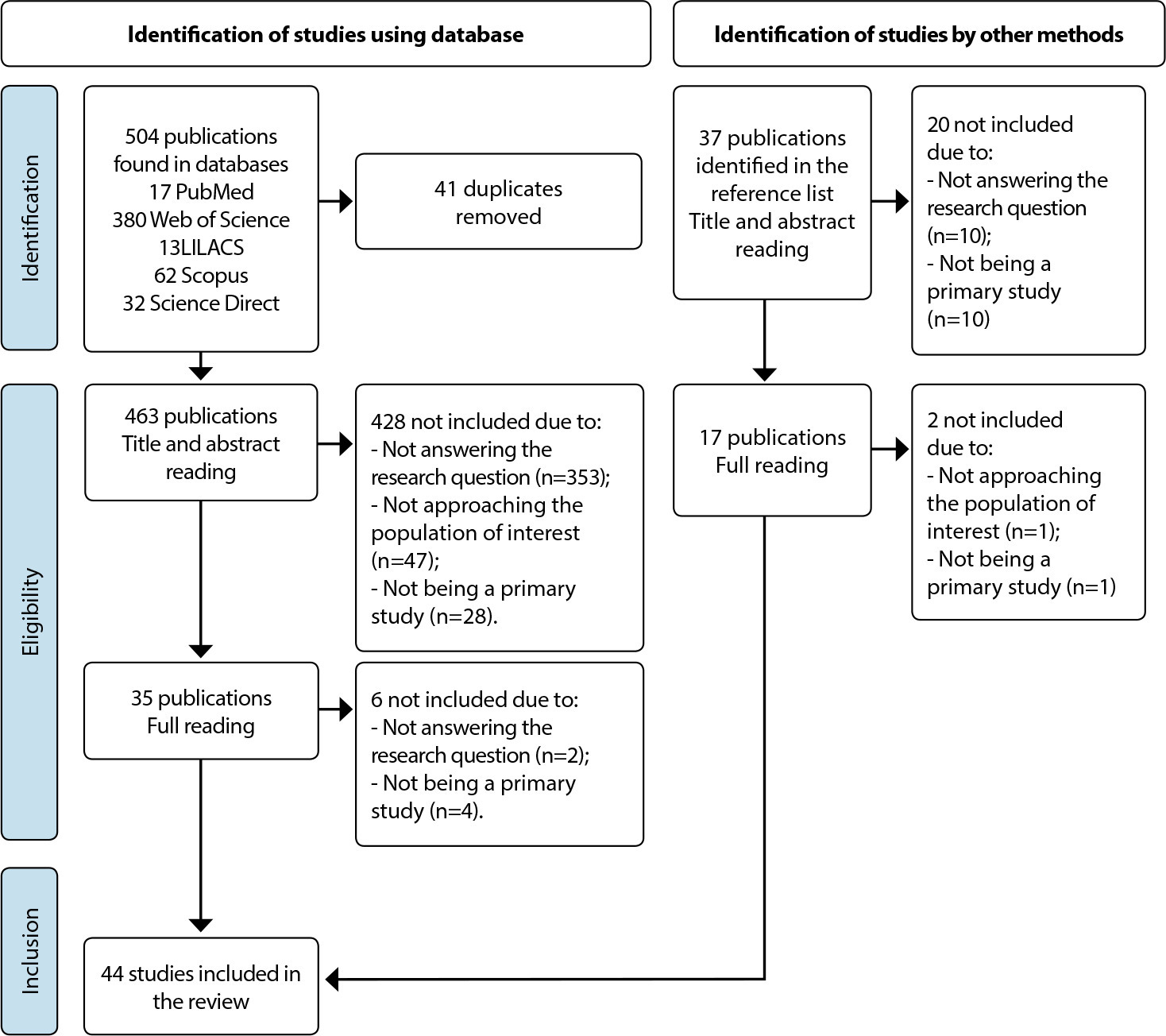-
Learning needs of Nursing students in technical vocational education
Revista Brasileira de Enfermagem. 2015;68(1):20-25
01-01-2015
Abstract
Learning needs of Nursing students in technical vocational education
Revista Brasileira de Enfermagem. 2015;68(1):20-25
01-01-2015DOI 10.1590/0034-7167.2015680103i
Views0See moreObjective:
identify learning needs of students of Technical Vocational Education (TVE) in Nursing. Qualitative study conducted in a city of São Paulo state.
Method:
the subjects were students, teachers and coordinators of TVE and students of the bachelor degree who have had contact with TVE. Data collection was performed by questionnaire socioeconomic and cultural circles about the learning needs. For data analysis we used the content analysis.
Results:
it was found that students have difficulties contents not related to nursing as portuguese and mathematics, as well as introductory courses in the course of TVE which possibly may interfere negatively in learning specific content of nursing and the quality of health care.
Conclusion:
it is necessary to rethink the content taught and ways to teach from basic education, as well as the training of teachers who now works in the TVE.
-
Serious game e-Baby: nursing students’ perception on learning about preterm newborn clinical assessment
Revista Brasileira de Enfermagem. 2015;68(1):13-19
01-01-2015
Abstract
Serious game e-Baby: nursing students’ perception on learning about preterm newborn clinical assessment
Revista Brasileira de Enfermagem. 2015;68(1):13-19
01-01-2015DOI 10.1590/0034-7167.2015680102i
Views0See moreObjective:
to evaluate students opinion regarding e-Baby educational technology.
Methodology:
exploratory descriptive study in which participated a sample composed of 14 nursing Portuguese students that used e-Baby digital educational technology in an extracurricular course. To achieve the aim of the study, the data collection was realized through an opinion instrument in Likert scale including the possibility of commentaries by students. Is was also collected data of participants’ characterization.
Results:
students made very satisfactory evaluations regarding the game e-Baby, varying since usability acceptation through suggestions of expansion of the game to other nursing themes.
Conclusion:
serious game e-Baby can be considered a didactic innovation and motivator tool of learning. Besides, it demonstrates have adequate interface in design and educative function aspects, evocating intense interaction between user and computational tool.

-
EDITORIAL
Challenges beyond the scientific knowledge production
Revista Brasileira de Enfermagem. 2015;68(1):7-8
01-01-2015
Abstract
EDITORIALChallenges beyond the scientific knowledge production
Revista Brasileira de Enfermagem. 2015;68(1):7-8
01-01-2015DOI 10.1590/0034-7167.2015680101p
Views0For several decades, innumerous appeals and reflections on how to build the nursing science and achieve visibility in the scientific world led researchers to make efforts to produce knowledge that contributed to the well-being of people, improving their quality of life, relieving their suffering and transforming the reality in which we live. In addition to […]See more
-
REVIEW
Financial-patrimonial elder abuse: an integrative review
Revista Brasileira de Enfermagem. 2019;72:328-336
12-05-2019
Abstract
REVIEWFinancial-patrimonial elder abuse: an integrative review
Revista Brasileira de Enfermagem. 2019;72:328-336
12-05-2019DOI 10.1590/0034-7167-2018-0703
Views0See moreABSTRACT
Objective:
to analyze the available evidence in the nursing literature about financial-patrimonial elder abuse.
Method:
integrative review of articles indexed in the databases CINAHL, Scopus, Web of Science, LILACS and MEDLINE, from 2007 to 2017. The combination of controlled and uncontrolled descriptors was used in Portuguese, English and Spanish.
Results:
15 studies developed in seven countries were included. In the thematic analysis, three categories emerged: epidemiological data, risk factors and institutions providing services to the elderly. The occurrence of this type of violence concomitantly to the other subtypes was highlighted among the most frequent.
Final considerations:
the literature points to important epidemiological data, risk factors and characteristics of this type of violence, including within institutions providing services to the elderly, in different countries, essential aspects for structuring and rethinking public policies for protection and appreciation of the elderly.

-
ORIGINAL ARTICLE
Vulnerability in the health of young transgender women living with HIV/AIDS
Revista Brasileira de Enfermagem. 2020;73(5):e20190046
07-06-2020
Abstract
ORIGINAL ARTICLEVulnerability in the health of young transgender women living with HIV/AIDS
Revista Brasileira de Enfermagem. 2020;73(5):e20190046
07-06-2020DOI 10.1590/0034-7167-2019-0046
Views0ABSTRACT
Objectives:
to analyze the health vulnerability of young female transgender living with HIV/AIDS.
Methods:
qualitative, descriptive, and exploratory study, based on the theoretical reference of Social Representation and concept of vulnerability; developed with six transgender women in a reference Hospital for HIV/AIDS. We analyzed the individual interviews, recorded, and transcribed in full, in the IRaMuTeQ software by Similitude Analysis.
Results:
the thematic categories are listed based on the Ayres reference: 1) Individual dimension of vulnerability to HIV/AIDS; 2) Social dimension of vulnerability to HIV/AIDS; 3) Programmatic dimension of the vulnerability.
Final Considerations:
the young female transsexual living with HIV/AIDS experience a context of vulnerability in health associated with a lack of knowledge and difficulties for the realization of self-care. The study evidenced the representations of social abjection and unpreparedness of the health team that compose the Primary Attention in Health in promoting qualified assistance for the execution of the effective and humanized care.
Keywords:Acquired Immunodeficiency SyndromeHealth VulnerabilityHIV InfectionsNursingTransgender PersonsSee more -
EDITORIAL
Women’s health during pregnancy, childbirth and puerperium: 25 years of recommendations from international organizations
Revista Brasileira de Enfermagem. 2019;72:1-2
12-13-2019
Abstract
EDITORIALWomen’s health during pregnancy, childbirth and puerperium: 25 years of recommendations from international organizations
Revista Brasileira de Enfermagem. 2019;72:1-2
12-13-2019DOI 10.1590/0034-7167-2019-72suppl301
Views0Women’s health during pregnancy, childbirth and the puerperium has been a concern of international bodies since the 1994 United Nations International Conference on Population and Development in Cairo, Egypt. This conference had as theme Women’s Health and Safe Motherhood. The rationale for choosing the theme was that pregnancy and childbirth-related complications were among the leading […]See more -
ORIGINAL ARTICLE
(Dis)continuation of care of the pre-term newborn at the border
Revista Brasileira de Enfermagem. 2020;73(3):e20180827
04-22-2020
Abstract
ORIGINAL ARTICLE(Dis)continuation of care of the pre-term newborn at the border
Revista Brasileira de Enfermagem. 2020;73(3):e20180827
04-22-2020DOI 10.1590/0034-7167-2018-0827
Views0See moreABSTRACT
Objectives:
to understand how continuation of care for the preterm newborn in the health care network at the border.
Methods:
the Grounded Theory was the methodological framework. Data were collected through 17 semi-structured interviews between July 2016 and March 2017.
Results:
“Describing the structure and functioning of the Child Nutrition Center” represents the context; “Experiencing and signifying premature birth” are the causal conditions; “Identifying conditions that intervene in the process of continuation of care for the preterm newborn” are the intervening conditions; “Ensuring continuation of care for the preterm newborn” are strategies; “Identifying (dis)continuation of care flows for the preterm newborn at the border” are the study’s consequences and phenomenon.
Final Considerations:
there is a need to plan referral and counter-referral flows of the preterm newborn and the commitment of public health managers to ensure continuation of care.
-
ORIGINAL ARTICLE
Wise Infant Development®: creation of a software for teaching in pediatric nursing education
Revista Brasileira de Enfermagem. 2022;75(5):e20210466
05-09-2022
Abstract
ORIGINAL ARTICLEWise Infant Development®: creation of a software for teaching in pediatric nursing education
Revista Brasileira de Enfermagem. 2022;75(5):e20210466
05-09-2022DOI 10.1590/0034-7167-2021-0466
Views0See moreABSTRACT
Objectives:
to create a software application for nursing education on child development assessment.
Methods:
this is a methodological applied research developed in three stages: analysis, design, and development. Product quality characteristics from the ISO/IEC 25010 standards were adopted. The programming language used was JavaScript. The educational software was developed based on a constructivist cognitive theory.
Results:
it was possible to create the software from the following quality metrics: functional suitability, reliability, usability, performance efficiency, compatibility, security, maintainability, and portability. The technology addresses child development in physical, cognitive, and psychosocial domains and how this assessment should be carried out in Brazil. The software has pre and posttests, 5 learning modules, certificate issuance, support for doubts, and an administrative panel. Final Considerations: it is concluded that the software adds to the existing tools for child development monitoring, facilitating students’ knowledge acquisition in promoting child health.

-
EDITORIAL
Nursing and the Sustainable Development Goals (SDGs): An Essential Commitment
Revista Brasileira de Enfermagem. 2023;76(6):e760601
12-04-2023
Abstract
EDITORIALNursing and the Sustainable Development Goals (SDGs): An Essential Commitment
Revista Brasileira de Enfermagem. 2023;76(6):e760601
12-04-2023DOI 10.1590/0034-7167.2023760601
Views0The Sustainable Development Goals (SDGs) are a global initiative launched by the United Nations (UN) in September 2015 as part of the 2030 Agenda for Sustainable Development, whose objectives summarize a universal call to action to end poverty, protect the environment and ensure that all people have access to opportunities and well-being, all in an […]See more -
REVIEW
Health needs of mothers of children with Congenital Zika Syndrome: an integrative review
Revista Brasileira de Enfermagem. 2022;75:e20210540
04-22-2022
Abstract
REVIEWHealth needs of mothers of children with Congenital Zika Syndrome: an integrative review
Revista Brasileira de Enfermagem. 2022;75:e20210540
04-22-2022DOI 10.1590/0034-7167-2021-0540
Views0ABSTRACT
Objectives:
to evidence and analyze the health needs of mothers of children with Congenital Zika Syndrome.
Methods:
a total of 44 articles published between October/2015 and March/2021 on PubMed, LILACS, Scopus, Web of Science and Science Direct were included. The RTI bank and CASP score were applied to classify the methodological quality of the studies. Reflective content analysis and Cecílio and Matsumoto’s taxonomy were used for analysis. Visual map was used as a technique for presenting the results.
Results:
mothers need access to social protection, family-centered, multi-professional empathetic monitoring, cultivating bonds and affection by professionals, sharing of care between health network services, strengthening the social support network and fostering coexistence groups between them.
Final Considerations:
intersectoral initiatives must be implemented for better housing conditions, fighting stigma, holding parents accountable and resuming life project.
Keywords:CaregiversCongenital AbnormalitiesHealth Service Needs and DemandMaternal and Child HealthZika Virus InfectionSee more
-
REFLECTION
War against the COVID-19 pandemic: reflection in light of Florence Nightingale’s nursing theory
Revista Brasileira de Enfermagem. 2020;73:e20200371
12-21-2020
Abstract
REFLECTIONWar against the COVID-19 pandemic: reflection in light of Florence Nightingale’s nursing theory
Revista Brasileira de Enfermagem. 2020;73:e20200371
12-21-2020DOI 10.1590/0034-7167-2020-0371
Views0See moreABSTRACT
Objective:
To reflect on the relationship and importance of the environmental theory regarding practices for promotion, prevention, and treatment of COVID-19.
Methods:
A theoretical-reflexive study about the COVID-19 pandemic in light of the environmental theory proposed by Florence Nightingale.
Results:
It is observed that the application of the theoretical foundations proposed by the environmental theory is related to the current practices used in the fight against the COVID-19 pandemic.
Final Considerations:
It is believed that the theoretical basis is fundamental for the critical-reflexive training of the nursing professional, for the consolidation of Nursing as a science; therefore, it could provide a foundation in nowadays battle against the pandemic.
Search
Search in:
Nuvem de Tags
Aged (144) Atenção Primária à Saúde (239) COVID-19 (104) Cuidados de Enfermagem (269) Educação em Enfermagem (151) Educação em Saúde (139) Enfermagem (930) Estudos de Validação (131) Health Education (144) Idoso (208) Mental Health (149) Nursing (987) Nursing Care (306) Patient Safety (151) Primary Health Care (284) Qualidade de Vida (104) Quality of Life (106) Saúde Mental (145) Segurança do Paciente (150) Validation Studies (108)



